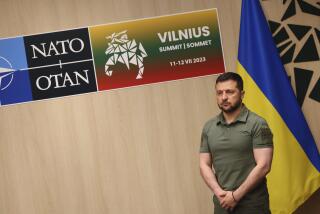Let Germany Abjure Force, Then Map Its Own Future : Germany: To the Soviets, a four-power settlement first and German self-determination afterward seems a logical way around the NATO question.
- Share via
To us Soviets, the sense of the latest summit was that our relations with the United States have come full circle. The post-Cold War era is coming to resemble in some ways the pre-Cold War era when, in the last days of Franklin Roosevelt, the United States and the Soviet Union regarded each other as partners, not enemies, and sought to achieve a “balance of interests” in the establishment of a new security order in Europe and the world.
Yet, on the fundamental issue of whether a united Germany should participate in NATO, there was no noticeable convergence. We left Washington holding the same position with which we arrived. The current American proposal for the inclusion of a united Germany in NATO is unacceptable to us precisely because it is rooted in the confrontational era of the Cold War and is inconsistent with the revival of our relationship as partners, not enemies.
We all know full well how NATO came into being--by a political philosophy that regarded the Soviet Union as an eternal enemy. This messianic mission of NATO is essentially still there. And that is obviously incompatible with the need for an all-European security and cooperation process. Germany’s inclusion in NATO would thus only perpetuate the division of Europe, which all parties proclaim they want to end.
An alternative proposition, which we presented for consideration by the United States at the summit, is a treaty, a final legal settlement or “act of peace.” Such a settlement would permanently resolve the external questions related to German unity, including its military status and the guarantee of borders, by creating the context for replacing the obsolete and costly system of bloc security with a system aimed at preventing the use of military force and counterforce in Europe.
In short, we propose discarding the outmoded Atlantic and Warsaw Pact alliances. We propose reaching a more demilitarized situation in which a new threat of war cannot under any circumstances come from German soil. That, after all, was the central meaning of the “German question” as formulated at Potsdam in 1945.
It seems to us that the best way to proceed is not to argue over Germany’s participation in NATO, but to achieve a settlement that codifies the rights and responsibilities of Germany according to international law. Then Germany should be returned its sovereign right to self-determination by rescinding the set of military and political decisions, including the Potsdam agreement, that accorded the four allied powers--the United States, Great Britain, France and the Soviet Union--the rights and responsibilities over Germany as a whole.
In this way, Germany can have its right to self-determination and the rest of Europe and the Soviet Union can be assured of peace. The broad outlines of a final peace settlement that would be signed by Germany, the United States, Great Britain, France and the Soviet Union would be as follows:
--Germany would be obliged not to use force or the threat of force to resolve conflicts of interest or pursue any objective.
--Germany would be obliged not to allow the use of its territory by any state or group of states seeking to obtain an objective incompatible with the fundamental provision of the settlement, which is that “no threat of war should come from German soil.”
--Germany would not produce, possess or station weapons of mass destruction in its territory.
If this set of conditions and a guarantee that the postwar borders would not be violated are complied with faithfully, the Soviet Union’s concerns about a united Germany would be removed.
From our standpoint, a peace settlement first and German self-determination afterward seems quite logical. Our aim is to provide space for the establishment of the pan-European security structure. If this final objective can be agreed to by the United States, it will give a new meaning and flexibility to all discussions about the participation in or restructuring of NATO.
Now that we have come full circle and are reviving our spirit of partnership, we have the opportunity to draw a historic line of demarcation between the Cold War era of force and confrontation and a new era based on common sense and balance of interests. Let’s not squander our opportunity the second time around.
More to Read
Sign up for Essential California
The most important California stories and recommendations in your inbox every morning.
You may occasionally receive promotional content from the Los Angeles Times.










